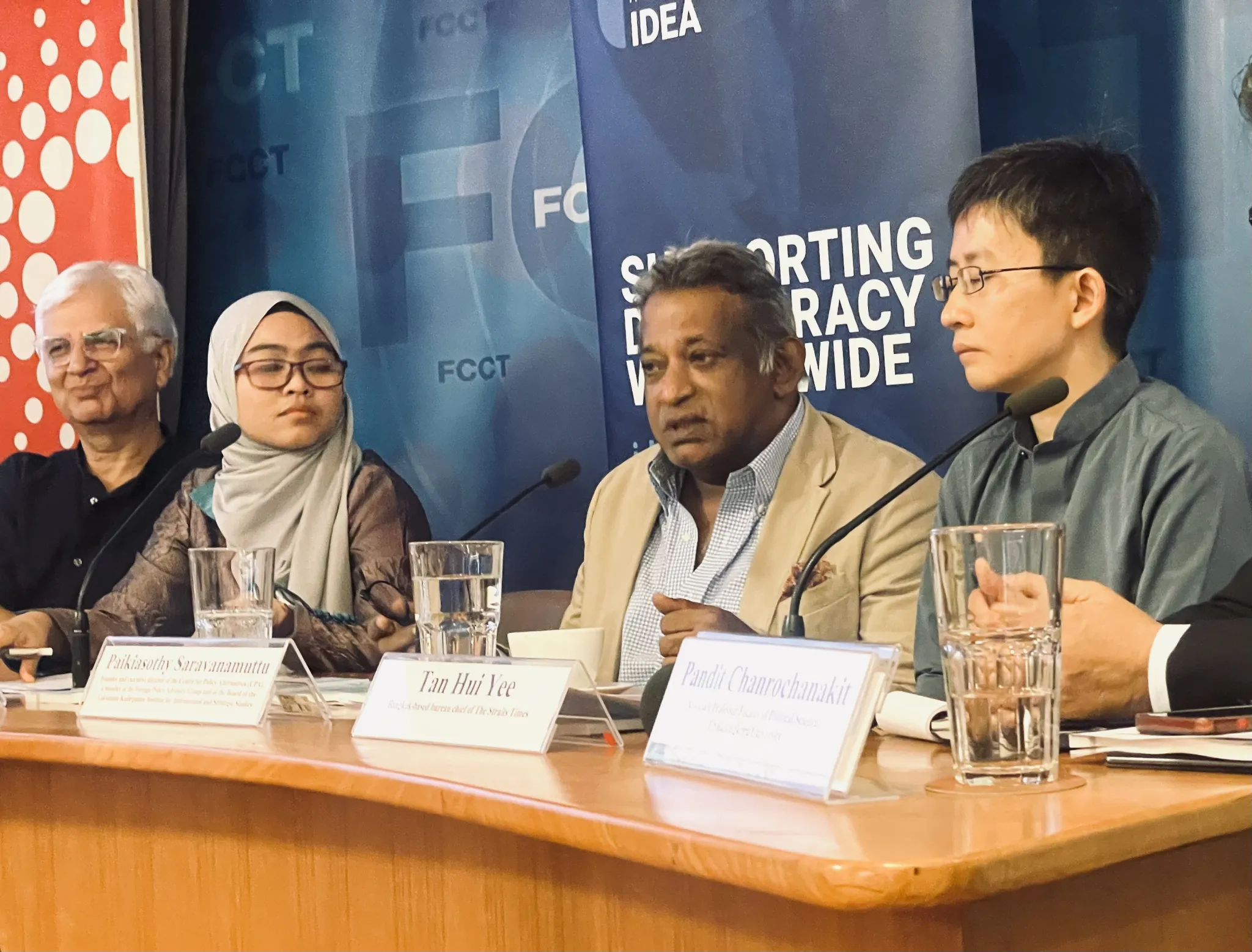Q&A: Sri Lankan Democracy with Dr. Paikiasothy Saravanamuttu

Dissanayake’s success is historic – he is the first president to come from outside the Sri Lanka Freedom Party/United National Party duopoly that has dominated Sri Lankan politics since independence. Contrary to expectations, the presidential elections were also notably free of the violence that had long been typical of Sri Lankan politics.
To discuss Sri Lanka’s democratic institutions and political challenges, International IDEA spoke with Dr. Paikiasothy Saravanamuttu, founder and Executive Director of the Colombo-based Centre for Policy Alternatives (CPA). Dr. Saravanamuttu was also a member of the Foreign Policy Advisory Group and the Board of the Lakshman Kadirgamar Institute for International and Strategic Studies. Below is a transcript of the discussion, edited for length and clarity.
International IDEA: What do you make of the conduct of presidential elections, and of the ongoing parliamentary campaign so far?
Saravanamuttu: First, the presidential elections were arguably the most peaceful presidential election on record. Violence broke out during previous elections when people were out putting up posters and other election material, or during small meetings in public that would then escalate to the burning of party offices - that kind of thing. But this year the intensity of the political debate – including false allegations and misinformation that usually fueled violence - moved online to social media. And on social media people tend to go to echo chambers. That, as well as hate speech online, is a separate issue that has got to be addressed, but I don't think that's really an issue in Sri Lanka alone.
Secondly, we introduced some campaign finance laws, which are by no means comprehensive, but nevertheless were enforced with a certain amount of discipline. We must say that the Election Commission, which is a new state institution, acted accordingly and prevented the government whenever it tried to, for example, introduce increases in the salaries of state employees. They put their foot down and said that it was wrong.
After the Aragalaya, people were angry and disgusted by the level of corruption, abuse and waste of state resources. The one party that was able to capitalize on that was the Janatha Vimukthi Peramuna (JVP), whose National People's Party (NPP) coalition campaigned on two grounds. One, of course, was that they had never been given power. Second, they said that they were the only ones who were willing, able and capable of doing something on corruption.
Although now a political party, the JVP was formerly an armed Marxist-Leninist revolutionary movement which launched two unsuccessful armed uprisings with the goal of establishing a socialist state. The second uprising in 1988-89 resulted in tens of thousands of deaths at the hands of the JVP’s armed wing, Sri Lankan and Indian militaries, and various other paramilitary groups. For more information see Moore 1993 and Asia Foundation 2017.
They had a very attractive candidate in Anura Kumara Dissanayake, who was basically a candidate from the people. He is from a rural area, has no links to Colombo, doesn’t have a political family and is a charismatic politician. His opponents were veterans of Sri Lankan politics that lacked his common touch. That said, he did get less than 50 per cent of the vote. There was a certain amount of caution and restraint on the part of the public, probably because they were not sure he was going to renegotiate the IMF agreement or whether the economy would be stable. They also remembered the ‘behavior’ of the JVP during the 1988-89 insurgency.
The JVP fared well in the south of the country amongst the Buddhist majority, but not amongst minorities and in the North. This is something they need to address going into the parliamentary election, where public enthusiasm to participate is somewhat lower. There is a broad assumption that the party that wins the presidential election will win the parliamentary election. The opposition is in quite a bit of disarray and there isn't much competition or a contest as such. We may have turnout in the 60s rather than in the 70s or 80s.
Voter turnout in parliamentary elections has fallen significantly below 70 per cent twice since Sri Lanka became an independent state in 1952, both in times of major political upheaval. The most recent case was the first election following the end of the Sri Lankan Civil War in 2010 and previously during the 1988-1989 JVP uprising (International IDEA 2024).
International IDEA: International coverage of Sri Lankan elections uses the economic crisis and the end of the civil war mostly as points of departure to explain the country’s financial position, or how elites in the former government gained power and the conditions that led to the economic and financial crisis. You and your colleagues at CPA recently published a report on the current state of one of the root causes of the civil war: land ownership and the interrelated ethnic and religious conflict in the north of Sri Lanka that remains unresolved. How do these longstanding issues play out in the current Sri Lankan political conjuncture?
Saravanamuttu: What's happened is that the previous government, and I think this new government as well to a certain extent, is relying on economic development as the principal instrument of reconciliation. But we need to do [political and social] reconciliation first. Otherwise, any plans for economic development or for getting ourselves out of the current crisis are not going to work.
We cannot put to the side the whole question of extrajudicial killings, disappearances, return of land, and accountability for war crimes. We promised in Geneva in 2015 at the United Nations Human Rights Council that we would repeal and replace the Prevention of Terrorism Act and in the presidential election campaign, [President Anura Kumara Dissanayake’s party] JVP said likewise. But now they're saying that they will reconsider it.
The Prevention of Terrorism Act, passed in 1979, has long been a focus of criticism from international organizations and human rights experts for permitting lengthy administrative detention with charges, a broad and poorly defined definition of ‘terrorism’, allowing confessions to be used in court even where there is significant evidence of torture, and curtailing judicial oversight. Sri Lankan governments have continued to make use of the Act despite promising its repeal in 2015 and a moratorium on its use in 2022.
On the 26th of November, the former Liberation Tigers of Tamil Eelam (LTTE) leader's birthday is coming up. Previous governments prohibited any kind of commemoration of his life as provocative and it will be interesting to see what the attitude of this government will be.
The government has said that they will pursue constitutional reform and that they will fully implement the 13th amendment to the Constitution, but they haven't said what they're going to do in concrete terms. However, voters in the north and east are also angry about corruption so there will be some kind of resonance to their policies at the present moment.
Velupillai Prabhakaran was the leader of the Liberation Tigers of Tamil Eelam (LTTE) militant group from its foundation in 1976 until he was killed in combat by Sri Lankan Army soldiers in 2009. Since his death, his birthday has been celebrated by supporters in the northern and eastern regions of Sri Lanka that the LTTE ran as a de facto state during the Sri Lankan Civil War, despite the efforts of the national government to suppress them.
International IDEA: Given the focus that all parties place on economic development as a tool for reconciliation, what do you make of the ability of any Sri Lankan government to make the right economic policy choices under the financial conditions some have called the “IMF trap?” Can the JVP develop an economic policy that provides equitable development within the constraints of the terms set by the international financial markets and the International Monetary Fund? Or, as many critics say, does the international financial system need to be changed first?
Saravanamuttu: Well, the JVP has said that they will not go outside or try to renegotiate the basic IMF framework for structural adjustment. They’re hoping to find wiggle room within that framework to fulfill their various promises, such as increasing social welfare while cutting taxes for those least able to bear them.
That is all well and good, but the issue is: where is the money going to come from? They haven't said anything apart from general statements about improving tourism and getting back money that disappeared due to corruption. Neither of these are solid bases. Getting back money lost to corruption is going to take time. They need to gather enough evidence to convict people in court. They cannot rely on some kind of extrajudicial mechanism for this.
They will have a fair amount of support if they do succeed, but to succeed they have to present a coherent economic policy which identifies clear priorities. The social contract in this country is in pieces and to rebuild it, you can't just say: ‘look, we're going to give more money to the poor.’ They must come up with a coherent policy of where they're going to get that money from, and they have to put it in place before we begin paying our external debt again in 2028. We can't go on another spending bonanza or else we will have no choice but to go back to the IMF, in which case we'll probably be given even stricter conditions.
The 13th amendment to the Sri Lankan Constitution was adopted in 1987 as an attempt to alleviate the ethnic conflict between Sri Lanka’s majority Sinhalese and minority Tamil populations and deescalate the Sri Lankan Civil War. The amendment devolved significant authority from the national to the provincial level and recognized Tamil, alongside Sinhala, as a national language of Sri Lanka. Several of the amendment’s stipulations have not been fully implemented, and it has historically met opposition from Sinhalese nationalists (on the grounds it cedes too much power to Tamils), the former LTTE and its modern-day descendants (on the grounds it does not cede enough), as well as from the JVP. Readers interested in the JVP’s historical opposition to the 13th amendment and its current ambivalence may consult this three-part series published by the Sri Lankan publication GroundViews.
International IDEA: What else is important for us to keep in mind in advance of the upcoming election?
Saravanamuttu: The lack of contestation. This is probably the first election in which the main political parties are talking about coming in second rather than first. While the JVP must be given enough seats to be able to govern, it is important they don’t end up with an enormous majority in parliament due to voter apathy and low turnout. It is tremendously important for people to realize they must vote, and that as much as we need a strong government, we also need strong opposition.




